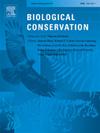大学生的环境身份揭示了野生动物保护的潜在冲突和共同点
IF 4.4
1区 环境科学与生态学
Q1 BIODIVERSITY CONSERVATION
引用次数: 0
摘要
“自然资源保护主义者”和“环境保护主义者”是两个突出的环境社会身份,经常被认为是相互冲突的,特别是在狩猎等楔子问题上。虽然这些团体可能持有不同的哲学,但他们的信仰可能重叠,这揭示了在保护方面合作的机会。我们调查了2018年至2020年22个州(n = 17,203)的美国大学生的环境认同,评估了认同、野生动物价值和对两极分化问题的立场。学生被分为四组:自然资源保护主义者(8%)、环境保护主义者(9%)、多元主义者(59%)和生态不可知论者(24%),两者都不表达。环境保护主义者表现出以互惠为中心的价值取向,而环境保护主义者表现出以统治为中心的价值取向,这是人口统计学上多样性最大的群体。自然资源保护主义者普遍支持狩猎和持枪权利,而环保主义者则支持动物权利。尽管存在这些差异,但两组人在保护关怀方面的得分都一样高,而且所有群体——包括生态不可知论者——都广泛支持出于利他原因(例如,生态效益,减少作物损失)的狩猎。我们的研究结果强调了由人口和基于价值的因素形成的独特而重叠的环境特征。这些身份虽然表现出两极化,但具有共同的关系价值观(例如,保护关怀,利他动机),这为合作提供了机会。尽管基于美国,但这些发现具有全球相关性,并反映了更广泛的趋势(例如城市化)对野生动物价值变化的影响。了解环境特征提供了一个框架,以协调不同文化背景下的保护工作,促进采取更具包容性和统一的方法应对全球保护挑战。本文章由计算机程序翻译,如有差异,请以英文原文为准。
Environmental identities of college students reveal potential conflicts and common ground for wildlife conservation
“Conservationist” and “environmentalist” are two prominent environmental social identities often perceived as conflicting, particularly on wedge issues like hunting. While these groups may hold differing philosophies, their beliefs could overlap, revealing opportunities for collaboration in conservation. We examined environmental identities among U.S. college students across 22 states (n = 17,203) from 2018 to 2020, assessing identity, wildlife values, and positions on polarizing issues. Students were classified into four groups: conservationists (8 %), environmentalists (9 %), pluralists (59 %) who expressed both identities, and eco-agnostics (24 %) who expressed neither. Environmentalists, the most diverse group demographically, exhibited mutualistic wildlife value orientations, while conservationists, the least diverse, expressed domination-centered value orientations. Conservationists broadly supported hunting and gun rights, while environmentalists favored animal rights. Despite these differences, both groups scored equally high on conservation caring, and all groups—including eco-agnostics—broadly approved of hunting for altruistic reasons (e.g., ecological benefits, reducing crop damage). Our findings highlight distinct yet overlapping environmental identities shaped by demographic and value-based factors. These identities, while appearing polarized, share relational values (e.g., conservation caring, altruistic motivations) that present opportunities for collaboration. Although based in the U.S., these findings have global relevance and reflect the impact of broader trends (e.g., urbanization) on shifting wildlife values. Understanding environmental identities offers a framework to align conservation efforts across diverse cultural contexts, promoting a more inclusive and unified approach to global conservation challenges.
求助全文
通过发布文献求助,成功后即可免费获取论文全文。
去求助
来源期刊

Biological Conservation
环境科学-环境科学
CiteScore
10.20
自引率
3.40%
发文量
295
审稿时长
61 days
期刊介绍:
Biological Conservation is an international leading journal in the discipline of conservation biology. The journal publishes articles spanning a diverse range of fields that contribute to the biological, sociological, and economic dimensions of conservation and natural resource management. The primary aim of Biological Conservation is the publication of high-quality papers that advance the science and practice of conservation, or which demonstrate the application of conservation principles for natural resource management and policy. Therefore it will be of interest to a broad international readership.
 求助内容:
求助内容: 应助结果提醒方式:
应助结果提醒方式:


